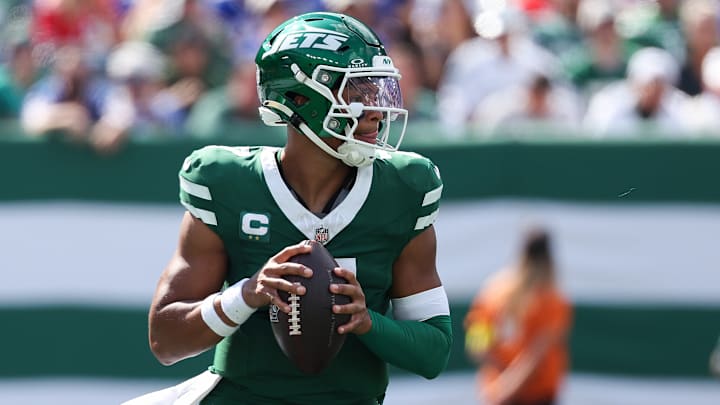Justin Fields has already shown two extremes in his short New York Jets career. In Week 1, he delivered one of the sharpest starts of his career, efficient with the ball, decisive as a runner, and giving the offense the balance it needed.
A week later in Buffalo, he turned in what might have been the worst outing of his career. The contrast between his first two games has already put his inconsistency under the microscope, but that does not mean a quarterback change should even be on the table.
Benching Fields now would ignore context, dismiss the small sample size, and repeat the kind of short-sighted mistakes that have haunted this franchise for years.
Through two games, the numbers tell a mixed story, as Fields owns a Pro Football Focus grade of 64.4, ranking 30th among 47 qualifying quarterbacks. His passing line sits at 245 yards with one touchdown, production that reflects both his Week 1 efficiency and Week 2 collapse.
The saving grace is that he has avoided interceptions and still brings a rushing threat. He remains one of only three quarterbacks in league history to average more than 50 rushing yards per game, a dimension that keeps him valuable even when the passing isn’t clean.
The Buffalo game exposed flaws that have followed him since Chicago. His processing was slow, his ball placement inconsistent, and his drives stalled. But two games in a new system is too small a sample to define him. Fields is still adjusting to Aaron Glenn’s offense, learning new receivers, and working behind a somewhat shaky line.
The question is whether he corrects the issues, and the only way to find out is by giving him time.
The Jets cannot afford another panic move at quarterback
This team has made quarterback changes too quickly before. Mark Sanchez was pulled in and out of situations when stability might have helped. Geno Smith never got a real chance to grow. Sam Darnold was shifted around while still learning the position.
Even in 2023, after Aaron Rodgers went down, the Jets bounced between short-term options while working through Zach Wilson's ineffectiveness.
Doing the same with Fields would send the wrong message. It would tell the locker room and the fanbase that the organization is still more interested in quick fixes than in seeing whether a quarterback, who has four years of experience but is new to this system, can develop.
There is also no reason to rush. Fields missed time after entering concussion protocol against Buffalo, so the evaluation is incomplete. Tyrod Taylor was fine stepping in against Tampa Bay, throwing for 197 yards and two touchdowns, but his ceiling as a journeyman late in his career is limited.
From Week 4 through Week 11, the Jets face opponents that have struggled, so if there's a stretch for Fields to step up and secure his position, it's this. If he improves, the Jets get clarity. If not, the decision can be revisited with more evidence than two starts and one nightmare outing.
Benching Fields now would be another shortsighted move in a long line of them. The Week 1 version of Fields showed why the Jets traded for him, while the Week 2 version showed the flaws that remain.
Two games should not define his future, but if the same problems remain by midseason, the conversation changes. For now, patience is the smarter path.
